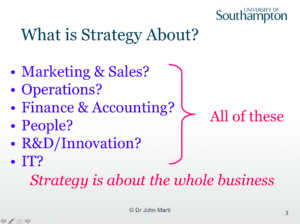フィリピン留学で学ぶMBAの英語(8) Human Resource Management
さて、今日はHRM / Human Resource Managementというモジュールのご紹介。いまでは、ヒューマン・リソース/エイチアールって和製英語にもなっていますよね。要は、人事全般についてです。人を採用して、教育して、日々のマネジメントをして、そんなことに関するレクチャーを受けて、結構色々と議論した思い出があります。
今回は、いつもとは違って、モジュールや試験・課題の紹介ではなく、モジュール全体のアウトラインについて説明します。というのも、さすがにMBAはしっかりと体系化されていて、すべてのモジュールについて明快なアウトラインの説明があるのです。これって、学生に対して非常に親切で、まず全体感を把握しないと気が済まないせっかちな私には非常にありがたいものでした。将来的には、セブ英語倶楽部のカリキュラムについて、こうしたアウトラインを作成したいと思います。
1、最初にイントロダクション(導入)があります。
Introduction to the module
The complex economic, social and technological changes that are continually shaping the context of work in organizations are having a profound impact on how to best manage and develop the people within them. This core module aims to equip students with a key foundation in human resource management (HRM) and in how it can be drawn upon to improve organizational effectiveness and performance.
The module focuses on developing appropriate knowledge and skills in order to utilize HR strategically so as to gain organizational benefits. They are multidisciplinary in being underpinned by management theory and drawing upon appropriate models and concepts from across the social sciences. The approach to learning offered by the teaching faculty combines independent study alongside group and tutored teaching that integrates theory, research and practice within a supportive pedagogical framework. The research of the lecturers on the programme feeds directly into their teaching of the unit, providing students with new and fresh insights into the topics covered.
More specifically, the aims of the module are:
1, To develop an appreciation of the realm of HRM and people management more generally
2, To provide an understanding of the potential of HRM and people management to contribute to improved organizational and business performance
3, To identify how strategic HRM can improve organizational performance
4, To provide an understanding of the range of human resource practices that can be used and identify appropriate contexts for their application
5, To develop an appreciation of the implications of the context within which organizations operate for people management
6, To develop an appreciation of the role of the line manager in promoting organizational performance
7, To develop an understanding of the evidence available on ‘what works at work’ which has appropriate regard to organizational context.
As the module evolves and progress is made covering core material, students will apply the concepts, frameworks and approaches it introduces to a particular organization to develop their knowledge and understanding.
少し長いですが、一体何を勉強するかしっかり説明されています。英語自体もロジカルでマネしたくなる文章です。やはりネイティブ(イギリス人)が書く英語は格好良いですね。ボキャブラリーも豊かで、一見難しそうですが非常に分かりやすい文章です。
次は、学習の成果です。このモジュールを勉強するとどういうことができるようになるかが、事細かに書かれています。
Learning Outcomes
The module is designed to nurture students’ understanding of people management by informing and directing their learning. By the end of the module students achieving well will be able to:
1, Identify the realm or arena of people management
2, Evaluate the appropriate measurement of organizational and business performance in a people management context
3, Identify how HRM strategies and practices can contribute to effective organizational and business performance
4, Describe influential frameworks for examining people management
5, Describe human resource strategies and practices used in organisations and identify appropriate contexts for their application
6, Compare, contrast and distinguish between best practice and best fit approaches to managing people
7, Evaluate the importance of internal and external fit in managing people for performance
8, Evaluate the available evidence on the performance benefits of people management approaches
9, Critically evaluate human resource strategies and practices used in organizations and identify appropriate contexts for their application
10, Apply their knowledge and understanding to analyze the potential of people management initiatives in particular organizations
11, Evaluate the strategic role of people management
12, Evaluate the roles and functions of the line manager in managing people
改めて読んでみると、基本的なビジネス単語がぎっしり詰まっていますね。これだけで、2時間くらいビジネス英語のレッスンができそうです。
その後、SessionsとTeaching and Learning Activitiesという項目(具体的にどうレクチャーやディスカッションを進めていくか)が続き、最後にAssessment(評価方法)についての説明が続きます。
(Summative) Assessment
Summative assessment, assessing students’ achievement in the module, is in two parts. The first element of summative assessment is the individual assignment or coursework (see appendix at the end of this guide).
After the end of the module, there will be a conventional exam (date TBC). This will allow a more broad ranging assessment of students’ critical engagement with the frameworks, concepts and evidence considered. The feedback on examination will be provided to students in the form of a written report that will appear on Blackboard within four weeks of students having taken the examination.
|
Type of assessment (summative) |
Format |
Percentage of the overall assessment |
Assessing which learning outcomes? |
|
Individual Coursework |
1000 words |
40% |
All |
|
Examination |
2 hours |
60% |
All |
いま思い出しました。このモジュールは、試験と課題(エッセイ)の両方があって結構面倒でした。ただ、既にMBAの半分を過ぎたこの頃は、参考文献もサクサク読めて、エッセイを書くコツも完全に掴めており、いくらでも文章を書けるくらいの余裕がありました。
如何でしたか?是非、中級以上の方には今日ご紹介した英文の解読にチャレンジして頂ければと思います。
★★★★★★★★★★★★★★★★★★★★★★★★★★★★★★★★
『フィリピン留学 ブログには書けない話』
非帰国子女として英語を10年間勉強し、
英国にMBA留学し、
フィリピンに4年住み、
セブ島で英語学校を経営してきた
知恵と経験を凝縮しました! 無料ですのでこのままご登録下さい
★★★★★★★★★★★★★★★★★★★★★★★★★★★★★★★★




